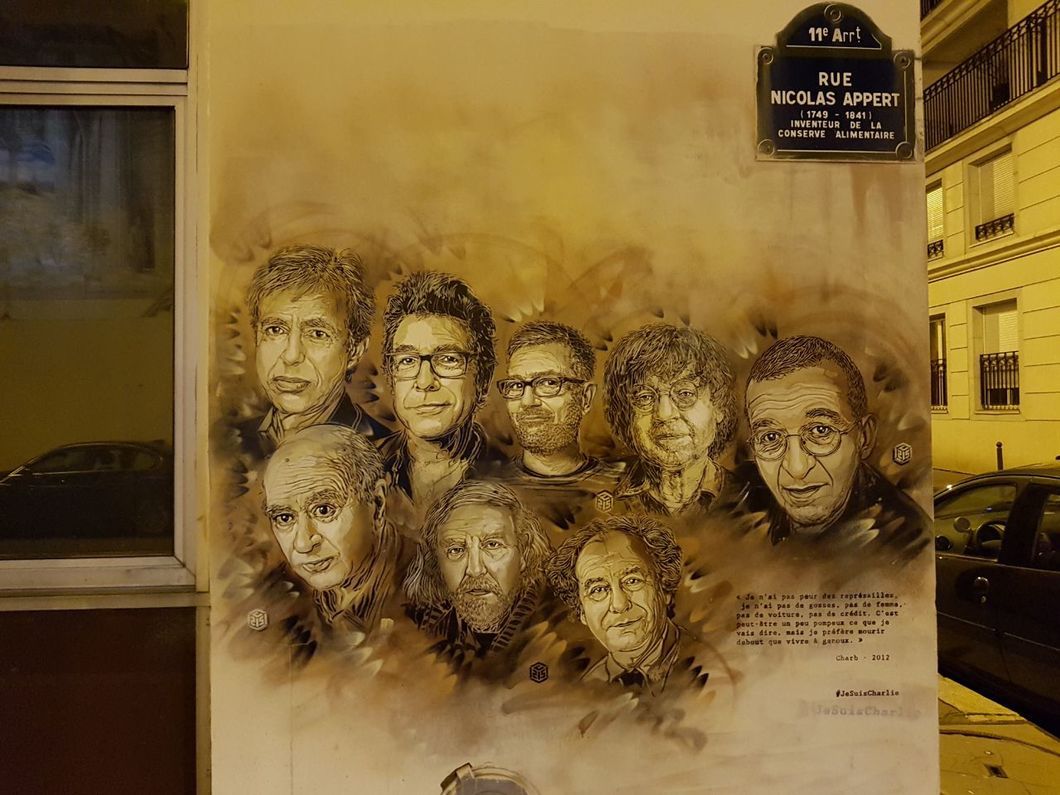Op-ed: Je suis Charlie - three years later

Based on an article from Novaya Gazeta
last week marked three years since the beginning of a series of the most violent terrorist attacks in the history of France. Early on 7 January 2015, a group of terrorists attacked the Paris-based office of the French satirical newspaper Charlie Hebdo, killing 12 people. A police officer was killed the next day. Then, on 9 January, the terrorists took people hostage at the kosher supermarket ‘Hyper Cacher’. Four hostages were killed then.
Few people came to Paris’ Republic Square to commemorate the victims, whereas three years ago, this very place and the adjacent area brought nearly 1.5 million people together with banners that read: ‘Je suis Charlie’. It was the last mass gathering of this kind. Terrorist attacks turned into a horrible routine. Rallying in the street with banners no longer inspired the people. The authorities didn’t welcome the idea of organizing mass gatherings either, because they feared there could be more attacks.
The investigation into the Charlie Hebdo terrorist attacks is drawing to a close
The Le Monde newspaper cited its sources saying that the investigation into the Charlie Hebdo and Hyper Cacher terrorist attacks should be finished somewhere between spring-summer this year, despite the fact that there are still plenty of ‘dark spots’ in the investigation. Fourteen people have been charged in the case, including the members of two criminal groups who were involved in arms trafficking.
One of these groups was led by Claude Hermant, a radical right-wing ‘figure’ of Lille, a retired soldier who was sentenced in October to 7 years on separate charges of arms trafficking from Eastern Europe. He claimed at the trial that he was not just a self-employed individual, but he also assisted the French gendarmerie and customs as an informant. His links with ‘law-enforcers’ had probably helped Hermant remain at large – until he was found to have sold six guns to terrorist Coulibaly who killed the police officer and the hostages in the Hyper Cacher supermarket. Coulibaly worked ‘jointly’ with the Kouachi brothers who committed the terrorist attack against Charlie Hebdo.
In this case, like in all other instances, the ‘law-enforcers’ and Hermant whom they patronized were unlikely ‘to play into the terrorists’ hands’. Fanatics just take advantage of the greed and the stupidity of the ‘unfaithful’. And they certainly make use of their unscrupulousness.
Three months before the terrorist attacks on Charlie Hebdo and Hyper Cacher, a large French company paid the terrorists to maintain their cement plant in Syria (at least it has been suspected of it now). The accused company employees now try to justify themselves, saying there were no terrorist attacks in France at that time. Generally speaking, their decision to pay to the terrorists for a ‘cover’ was fully coordinated with French diplomats.
Why ‘Je suis Charlie’
A few months later one of them probably joined the millions of people who marched across Republic Square with the slogan – ‘Je suis Charlie’.
It’s not that that those diplomats and top managers of the cement plant are directly or indirectly guilty of any terrorist attack – they didn’t fund the terrorist attacks, did they? They financed the safety of their plant and thought about the financial prosperity of their country.
Those who proudly say ‘I’m not Charlie’ and who justify murder ‘on the grounds’ of ‘revenge for the Prophet’ or ‘desecrated religion’, aren’t directly guilty of each next terrorist attack either. Terrorist attacks are mostly committed by some highbrow guys who don’t tend to come under others’ influence, aren’t they?
It’s really sad that only 61% of the French (10% less than a year ago) said in January 2018: ‘I’m still Charlie’. The country should hold on to this slogan, because its main idea is to support the freedom of speech, which should be pronounced without any fear that one will be killed for that.
On 11 January 2015, four million people took to the streets across France holding the banners that read- ‘Je suis Charlie’.
Philippe Lançon, a journalist working for Libération and Charlie Hebdo who was seriously injured in the terrorist attack on the newspaper’s office, wrote a column about this slogan tree years later:
“What the slogan ‘Je suis Charlie’ meant at that time was: ‘I don’t necessarily read Charlie, I don’t necessarily like Charlie, but I’m against killing them for what they do…Then everybody stood up out of principle, they stood up for life, for the victory of the principles of life.
“This slogan was later made trite by the politicians and the ‘sowers’ of hatred worldwide. So, it has stopped being that meaningful for many. Yet, one shouldn’t forget its initial meaning.
“What the slogan ‘Je suis Charlie’ still means to me is that I want to feel free to write and read to my liking, and that others also enjoy that freedom,” wrote Lançon, who still works at Charlie Hebdo. It’s a rather heavy burden.



















